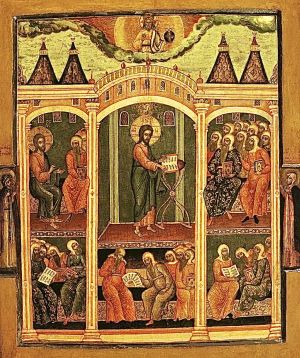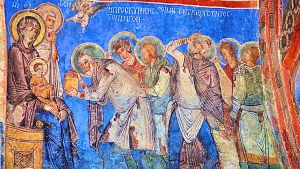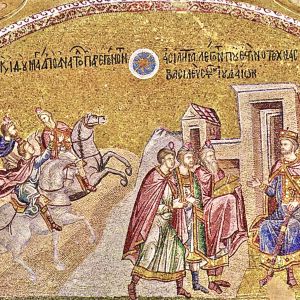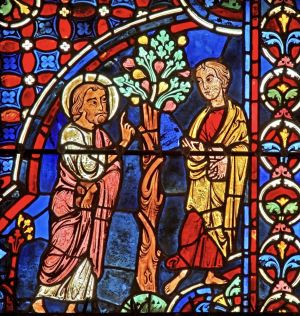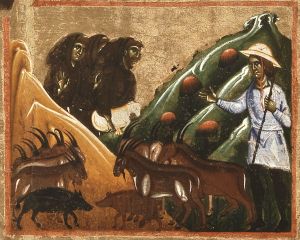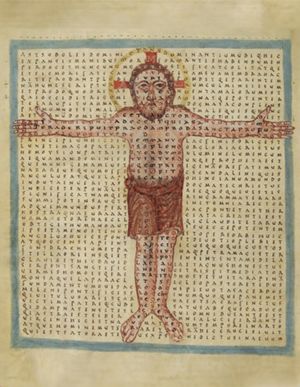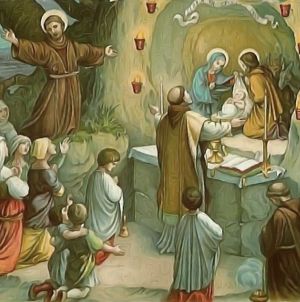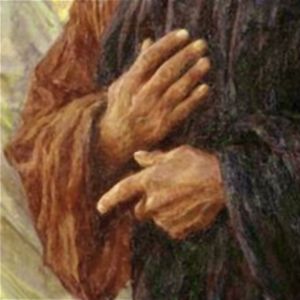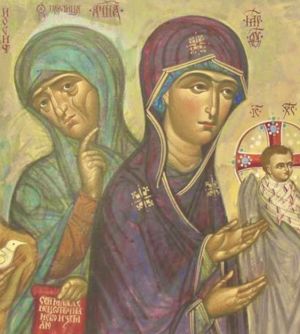
Teresa Girolami
Teresa Girolami è laureata in Materie letterarie e Teologia. Ha pubblicato vari testi, fra cui: "Pellegrinaggio del cuore" (Ed. Piemme); "I Fiammiferi di Maria - La Madre di Dio in prosa e poesia"; "Tenerezza Scalza - Natura di donna"; co-autrice di "Dialogo e Solstizio".
In today's Gospel, Jesus preaches conversion and announces the nearness of the Kingdom, as he travels throughout Galilee healing all kinds of illnesses and infirmities, bringing his Light.
For Francis, St Mary of the Angels was his dearest place, for it was here that he came to know the humility of his origins.
About it a friar, very devoted to God, before his conversion had this vision.
"It seemed to him that he saw innumerable men, stricken with blindness, standing around this church, on their knees and with their faces turned towards heaven.
They all stretched out their hands upwards and, weeping, they cried out to God for mercy and light.
And behold, there came from heaven an immense splendour, which, penetrating into them all, brought to each one the desired light and salvation" (FF 1049).
«Repent, for the kingdom of heaven is at hand» (Mt 4:17)
Francis attained Grace and changed his life "began to reproach himself for his own pusillanimity and cowardice and, having left his hiding place and cast off fear, set out on the journey to Assisi.
His fellow citizens, seeing him squalid in face and changed in mind, believing him to be out of his mind, threw mud and stones from the streets at him, and, shouting and clamouring, insulted him as a madman, a demented person" (FF 1041).
But those who encountered Christ in earnest always considered all this 'rubbish'.
Clare too had made room for the kingdom of heaven close by, living it from her youth.
In fact we read from the Acts of the canonisation process:
"About the conversion of St Clare in her father's house.
1. Sister Pacifica de Guelfuccio de Assisi, a nun of the monastery of Saint Damiano, swore: that she knew Saint Clare while she was in her father's house; and that by all those who knew her, she was held to be of great honesty and a very good life; and that she was intent and occupied about the works of piety.
Of her conversion.
2. And he said that St Clare by the admonition of St Francis began the Order which is now in St Damiano [...].
3. And said that the Lady Clare loved the poor very much; and because of her good conversion all the citizens held her in great veneration [...].
Proper feria of January 7 (Mt 4:12-17.23-25)
The Epiphany of the Lord offers evangelical expressions of extraordinary beauty. On the lips of the Magi we find a phrase that belongs to us, as worshippers of the Child of Bethlehem: "We saw his star appear and we came to adore him" (Mt 2:2).
In Francis of Assisi the breadth, the height and the depth of the Mystery of the Manifestation of the Son of God has singular connotations not to be overlooked.
We need only think of some passages from the Sources that record the extent of this.
"The Saint willingly stayed in the hermitage of Greccio, both because he saw it as rich in poverty and because from a secluded cell, built on the prominent rock, he could devote himself more freely to the contemplation of heavenly things.
It was precisely this place, where some time before he had celebrated the Christmas of the Child of Bethlehem, making himself a child with the Child" (FF 621).
Again: 'He could not think back without weeping how much penury the poor Virgin had found herself in [...].
Once, while he was sitting at lunch, a friar reminded him of the poverty of the Blessed Virgin and the destitution of Christ her Son. Immediately he got up from the table, burst into sobs of sorrow [...].
That is why he called poverty a royal virtue, because it shone with such splendour in the King and Queen" (FF 788).
The Star that guides Francis to the grotto to adore the Son of God is Poverty. This shines in the penury of Bethlehem and moves him to tears.
To the Child-God the Little One of Assisi offered the gold of his love for the poor, the fire of his continual contemplation of the Mystery and the myrrh of the many sufferings received in custody from the Gift of the Father, unrolled for us on earth.
His closeness to the people was such that he wore a very poor cassock, which resembled the rough tunic of the poor.
All his friar sons were also close to the people, and all this made him a Worshipper par excellence of the bare Deity, only clothed in flesh; a figure close to the needs of man.
"One day a poor man asked him for alms, and he, having nothing to hand, unbuttoned a flap of his cassock and gave it to the poor man.
Other times, for the same purpose, he even took off his trousers.
Such was the tender compassion he felt for the poor and such was the affection that drove him to follow in the footsteps of the poor Christ" (FF 677).
And of this making a gift of himself to the King in the poor he tried, with great care, to inform his brothers.
One episode attests to this:
"He was certainly good-hearted by nature, but he became doubly so through the charity that was given to him from on high [...] Whatever the need and whatever need he saw in others [...] he referred them to Christ.
Thus in all the poor he recognised the Son of the poor Madonna and bore naked in his heart the One whom she had carried naked in her arms' (FF 670).
She worshipped in her heart the Child who had become a Gift for humanity, and she sought His likeness in those who most closely displayed His features. So much so that once, meeting a poor man and observing his extreme nakedness, she said to the friar who accompanied her:
"I have chosen poverty for my wealth and my woman: but here it shines most brightly in this one.
Knowest thou not that it is known throughout the world that we are the poor for Christ's sake?
But this poor man convinces us that this is not so" (FF 671).
Following the star of the holy evangelical poverty of which Francis was in love, he came to the grotto of the Manifestation, where all are called to adore the Son of God.
He tasted Beauty made flesh by another road, far from the not so few 'Herods' sons of deception.
"The man of God stood before the manger, filled with pity, sprinkled with tears, overflowing with joy" (FF 1186).
«We saw his star rising and came to worship him» ( Mt 2:2)
Epiphany of the Lord (Mt 2:1-12)
Jesus addresses Nathanael, a pious Israelite in whom there is no falsehood and committed to the profession of faith, who will see greater things than those already contemplated.
In the light of the Gospel episode, comparing the Franciscan Sources, we discover interesting passages.
Captivated by the newness of the Spirit, Francis changes his life and becomes a sign of contradiction for a world that had no desire to depart from the commonplace, from the path of traditions.
His free heart faces every contempt, in order to be loyal to Christ and his Gospel.
"Francis, the illiterate, the friend of simplicity, with an incomparably sincere and noble heart [...] how much this name of Francis befits him, to him who had a frank and noble heart more than any other" (FF 529).
Embracing his new state of life, one day, to the brigands who attacked him asking who he was, in sincerity, he replied:
«I am the herald of the great King; does that interest you?» (FF 346).
He can be considered 'an Israelite' in whom no falsehood dwells!
«You will see greater things than these!» (Jn 1:50)
Proper Feria of January 5 (Jn 1:43-51)
«For from his fullness we all received, and grace upon grace»
Francis was rapt in ecstasy as he meditated on the Beauty of a God who asks to be received in order to pour out his Love. The faith that animated him opened up new horizons and new proposals.
He was attracted by this 'humanised' God, who became Small so that man could live as a new creature.
Hence his search for contemplation, hidden spaces devoted to the wonder of the Mystery.
The Sources attest to the Grace in him:
"The Father used not to neglect any visitation of the Spirit: when it presented itself to him, he welcomed it and enjoyed the sweetness that was given to him, as long as the Lord allowed it.
Thus, if he gradually felt a few touches of the Grace while he was cramped with commitments or on a journey, he tasted that sweet manna on several and frequent occasions.
Even on the way he would stop, letting his companions go on, to enjoy the new visitation of the Spirit and not receive grace in vain" (FF 682).
(FF 682) "He tried with all care to hide the gifts of the Lord in the secret of his heart, because he did not want that, if they were an occasion of human glory, they should also be a cause of ruin for him [...] Turning then to himself he would say:
"If the Most High had granted such great graces to a thief, he would be more grateful than you, Francis!
For, as the Poor Man of Assisi wrote in his paraphrase to the Our Father:
"You reign in us through Grace and make us come into your kingdom, where the vision of you is without veils, the love of you is perfect, the communion of you is blissful, the enjoyment of you without end" (FF 269).
2nd Sunday after Christmas, (Jn 1:29-34) in part v.16
«Behold the Lamb of God, the one who takes away the sin of the world».
Francis, the Minim, loved all animals, but he had a particular fondness for the lamb, because it reminded him of the Lamb of God sacrificed for our Redemption.
The mere thought of the Son of God sent to the slaughter moved him deeply, even to tears.
The Sources, an inexhaustible treasure chest of early life, offer us very significant pictures in this regard.
"He had a special tenderness for lambs, because in Scripture Jesus Christ is often and rightly compared to the meek lamb because of his humility.
For the same reason, his love and sympathy turned in a special way to all those things that could best depict or reflect the image of the Son of God" (FF 455).
"Another day, on a pilgrimage through the same March, with the same Brother Paul, who was very happy to accompany him, they came across a man who was bringing to market two lambs to sell, tied, bleating and dangling from his shoulders.
On hearing those bleats, the servant of God, greatly moved, approached them, stroking them, as a mother does with her crying children, with much compassion, and said to the master:
"Why do you torment my brother lambs, keeping them so tied and dangling?"
He answered: "I am taking them to the market and selling them: I need money". And Francis: "What will become of them?" And they: "The buyers will kill them and eat them".
On hearing this the Saint exclaimed: "Never let it be! Take my cloak as recompense and give me the lambs".
The man was well pleased with such a barter, for the cloak, which Francis had received on loan from a man that very day to shelter him from the cold, was worth much more than the two beasts.
But having received the lambs, the saint again realised the awkward problem: "How to provide for them?" and, on the advice of Brother Paul, he returned them to their master, advising him not to sell them, not to harm them in any way, but to keep and guard them with care" (FF 457).
Proper Feria of January 3 (Jn 1:29-34)
The Gospel passage presents the testimony of John, the Forerunner.
To those who ask him who he was, he presents himself as «Voice of one crying out in the wilderness» (Jn 1:23).
He baptised with water in order to prepare hearts for the One who comes and to whom the Baptist does not even feel worthy to untie the lace of his sandals.
The humble and strong testimony of the Precursor is echoed by that of Francis who, barefoot, announces the One who revolutionised his existence: Jesus - who baptised him in Holy Spirit and Fire.
Like John, the Poor Man perceives himself as unworthy and inadequate; but the Resurrection he has received has transformed him into a bold Herald of the Great King, for whom he wishes to prepare the way.
Jesus is the Way, but he sends before him heralds of the Kingdom, of the Word made flesh.
In the Sources we read:
"A great many, inflamed by his preaching, bound themselves to the new laws of penance, according to the form indicated by the man of God.
The servant of Christ established their form of life to be called the Order of the Brothers of Penance.
This new Order admitted all, clerics and laymen, virgins and spouses of either sex, because the way of penance is common to all who wish to strive for heaven" (FF 1073).
"He, in fact, had been elected by God, like a new Elijah, to be chariot and charioteer of spiritual men" (FF 1070).
Yes, Francis was and remains the Voice of one who, at that time, cried out in the desert of the world and continues to do so by his example, exhorting us to do our part as he did his.
«I am the voice of one who cries out in the wilderness. Straighten up the way of the Lord, as the prophet Isaiah said» (Jn 1:23)
Proper feria on 2 January (Jn 1:19-28)
«And they came with haste and found Mary and Joseph and the child lying in the manger [...] now Mary kept all these words and events, comparing them in her heart» (Lk 2:16, 19).
Francis was attracted to the figure of Mary, the Mother of God; She who, in profound humility, had been the grace-filled, virginal cradle of the blessed Son.
To her he dedicated praises, prayers and places in the community, placing the Order itself under her maternal protection.
In the Sources we read:
"He finally went to a place called the Portiuncula, in which there was a church dedicated to the Blessed Virgin: an ancient building, but then absolutely neglected and abandoned. When the man of God saw it thus abandoned, driven by his fervent devotion to the Queen of the world, he fixed his abode there, with the intention of repairing it. There he often enjoyed the visit of the Angels, as the name of the church itself, called St Mary of the Angels since antiquity, seemed to indicate. Therefore he chose it as his residence, because of his veneration for the Angels and his special love for the Mother of Christ [...].
This place, at the time of his death, he recommended to the brothers as the place dearest to the Virgin' (FF 1048).
And again: 'He often recalled to mind, weeping, the poverty of Jesus Christ and of his Mother, and affirmed that this is the queen of virtues, because one sees it shine so brightly, more than all the others, in the King of kings and in the Queen his Mother' (FF 1118).
To the Mother of God he gave his tribute of honour in the wonderful prayer, best known of all: the "Salutation to the Blessed Virgin Mary".
"Hail, Lady, holy Queen,/
holy Mother of God Mary,/
Thou virgin made Church [...].
Thou in whom was and is every fullness of grace and every good" (FF 259).
In Her he always repeated "May the Lord give you Peace" - wherever he went. Greeting revealed to him by the Most High.
The figure of Clare herself in the Sources is recalled as the "imprint of the Mother of God", and to Francis she recalled Mary's veracious freshness and her extraordinary identification of life and spiritual traits.
This Marian physiognomy, reflected in her disciple, helped the beginnings of the Order, giving her an essential role in the mission that united the two Poor of Assisi.
Mary Most Holy Mother of God, 1 January (Lk 2:16-21)
In his Prologue, John speaks to us of the Word made one of us, as a sign of God's gratuitous love and unwavering faithfulness towards us.
In his autograph writings, in his Letter to the Faithful, Francis emphasises:
"The Most High heavenly Father, through his holy angel Gabriel, announced this Word of the Father, so worthy, so holy and glorious, in the womb of the holy and glorious Virgin Mary, and from her womb he received the true flesh of our humanity and frailty.
He who was rich above all else, chose in this world, together with the most blessed Virgin, his mother, poverty" (FF 181-182).
And Clare in her Testament echoes this by saying:
"The Son of God became our Way; and this by word and example our blessed father Francis, a true lover and imitator of Him, showed and taught us" (FF 2824).
Yes, Francis contemplated the Word of God made flesh.
That is why the sacred live nativity scene was born, to see with the eyes of the body the hardships suffered by the God made one of us.
The Sources say:
"The Saint is there ecstatic before the crib, full of sighs, his spirit vibrating with compunction and ineffable joy" (FF 469).
«And we have contemplated his glory» (Jn 1:14).
Francis and Clare meditate and contemplate the Fullness of Light that has come to visit us as the rising sun that gives Hope to all men, those reborn of water and the Spirit.
31 December - VII day between the Octave of Christmas (Jn 1:1-18)
«He began to praise God and spoke of the Child to those who were waiting for the redemption of Jerusalem» (Lk 2:38)
Francis of Assisi considered Holy Christmas the feast of feasts. From there, in fact, had started the salvific parable of a merciful Father who wanted to "unroll like sackcloth" his divinity and humanity through the Gift of his Son.
That is why he infinitely praised God and spoke of the Child and the salvation He brought to all men at every opportunity, opportune and not opportune.
The depth of his prophetic spirit, received by Grace, made him capable of going beyond the immediate with refined inner insight.
In the Treasury of Sources we find particularly significant passages:
"The man of God stood before the manger, filled with pity, sprinkled with tears, overflowing with joy.
The holy sacrifice is celebrated above the manger and Francis, Christ's Levite, sings the holy Gospel.
He preaches to the people and speaks of the birth of the poor king and, in naming him, calls him, out of tenderness of love, the 'Child of Bethlehem'.
A virtuous and sincere knight who had left the scholastic militia and had become very attached to the man of God, Mr John of Greccio, claimed to have seen, inside the manger, a beautiful sleeping child, whom the blessed Francis, holding him with both arms, seemed to rouse from sleep.
This vision of the devout knight is rendered credible by the holiness of the witness, but it is also substantiated by the truth it indicates and confirmed by the miracles by which it was accompanied.
For the example of Francis, re-proposed to the world, had the effect of reawakening faith in Christ in numb hearts; and the hay from the manger, preserved by the people, had the power to heal sick beasts and drive away various other diseases.
Thus God glorifies his servant in all things and shows the efficacy of holy prayer with the probing eloquence of miracles" (FF 1186).
And Clare herself, the first plant of the Seraphic Father, in her stupendous Testament, while entrusting all her present and future daughters to the custody of the Lord Cardinal, expresses herself thus:
"For the love of that Lord, who poor at his birth was placed in a crib, poor lived on earth and remained naked on the cross, may he take care to make this little flock of his observe - this which the Most High Father, through the word and example of our blessed father Francis, generated in his holy Church precisely to imitate the poverty and humility of his beloved Son and of his glorious Virgin Mother [...]" (FF 2841).
Francis and Clare of Assisi: two stars of the firmament that illuminate the salvific Mystery of a God made flesh, who came to give Himself to every person and reality that claims salvation.
30 December - sixth day between the Octave of Christmas (Lk 2:36-40)
The Church was built on the foundation of the Apostles as a community of faith, hope and charity. Through the Apostles, we come to Jesus himself. Therefore, a slogan that was popular some years back: "Jesus yes, Church no", is totally inconceivable with the intention of Christ (Pope Benedict)
La Chiesa è stata costituita sul fondamento degli Apostoli come comunità di fede, di speranza e di carità. Attraverso gli Apostoli, risaliamo a Gesù stesso. È pertanto del tutto inconciliabile con l'intenzione di Cristo uno slogan di moda alcuni anni fa: "Gesù sì, Chiesa no" (Papa Benedetto)
Intimidated by the nightmare of demons and concrete dangers, the crowds could not see the possibility of emancipation from an existence of obsessions - slavish, frightened, lost, overwhelmed...
Intimidite dall’incubo di demoni e pericoli concreti, le folle non riuscivano a vedere possibilità di emancipazione da un’esistenza di ossessioni - pedissequa, spaventata, smarrita, sopraffatta…
Justification incorporates us into the long history of salvation that demonstrates God’s justice: faced with our continual falls and inadequacies, he did not give up, but wanted to make us righteous (Pope Francis)
La giustificazione ci inserisce nella lunga storia della salvezza, che mostra la giustizia di Dio: di fronte alle nostre continue cadute e alle nostre insufficienze, Egli non si è rassegnato, ma ha voluto renderci giusti (Papa Francesco)
Against this cultural pressure, which not only threatened the Israelite identity but also the faith in the one God and in his promises, it was necessary to create a wall of distinction, a shield of defence to protect the precious heritage of the faith; this wall consisted precisely in the Judaic observances and prescriptions (Pope Benedict)
Contro questa pressione culturale, che minacciava non solo l’identità israelitica, ma anche la fede nell’unico Dio e nelle sue promesse, era necessario creare un muro di distinzione, uno scudo di difesa a protezione della preziosa eredità della fede; tale muro consisteva proprio nelle osservanze e prescrizioni giudaiche (Papa Benedetto)
It is not an anecdote. It is a decisive historical fact! This scene is decisive for our faith; and it is also decisive for the Church’s mission (Pope Francis)
Non è un aneddoto. E’ un fatto storico decisivo! Questa scena è decisiva per la nostra fede; ed è decisiva anche per la missione della Chiesa (Papa Francesco)
Being considered strong, capable of commanding, excellent, pristine, magnificent, performing, extraordinary, glorious… harms people. It puts a mask on us, makes us one-sided; takes away understanding. It floats the character we are sitting in, above reality
Essere considerati forti, capaci di comandare, eccellenti, incontaminati, magnifici, performanti, straordinari, gloriosi… danneggia le persone. Ci mette una maschera, rende unilaterali; toglie la comprensione. Fa galleggiare il personaggio in cui siamo seduti, al di sopra della realtà
The paralytic is not a paralytic
Il paralitico non è un paralitico
The Kingdom of God is precisely the presence of truth and love and thus is healing in the depths of our being. One therefore understands why his preaching and the cures he works always go together: in fact, they form one message of hope and salvation (Pope Benedict)
Il Regno di Dio è proprio la presenza della verità e dell’amore e così è guarigione nella profondità del nostro essere (Papa Benedetto)
duevie.art
don Giuseppe Nespeca
Tel. 333-1329741
Disclaimer
Questo blog non rappresenta una testata giornalistica in quanto viene aggiornato senza alcuna periodicità. Non può pertanto considerarsi un prodotto editoriale ai sensi della legge N°62 del 07/03/2001.
Le immagini sono tratte da internet, ma se il loro uso violasse diritti d'autore, lo si comunichi all'autore del blog che provvederà alla loro pronta rimozione.
L'autore dichiara di non essere responsabile dei commenti lasciati nei post. Eventuali commenti dei lettori, lesivi dell'immagine o dell'onorabilità di persone terze, il cui contenuto fosse ritenuto non idoneo alla pubblicazione verranno insindacabilmente rimossi.


